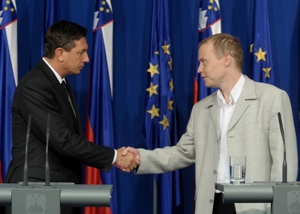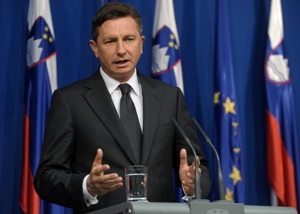NEWS
Press conference of the Prime Minister of the Republic of Slovenia
At today’s 90th regular session, the Slovenian Government, alongside other resolutions, adopted the National Renewable Energy Action Plan and Guidelines for Slovenia's Policy on the Western Balkans. Moreover, it took note of the resignation of Minister of the Economy, Matej Lahovnik. Prime Minister Borut Pahor said that cooperation with Mr Lahovnik was exemplary and marked by great willingness to seek good solutions. He thanked him for his devoted and correct work for the Government and then answered a number of topical questions.
(Photo: Tamino Petelinšek/STA, source: UKOM)
Today, the ministerial corps adopted the National Renewable Energy Action Plan to be forwarded to the European Commission by the Ministry of the Economy. The Government entrusted the Ministry with the task of performing a comprehensive environment impact assessment for the Action Plan within the Resolution on the National Energy Programme and adapt the Programme according to the findings of the Environmental Report. The Directive on the promotion of the use of energy from renewable sources provides that every Member State must adopt the National Renewable Energy Action Plan (AN-OVE) for the period 2010-2020. In accordance with the above Directive, Slovenia set its national objectives for energy shares from renewable sources consumed in transport and electricity sector and for heating and cooling in 2020. In addition, the Member States had, in accordance with this Directive, to publish and forward to the European Commission the Forecast on estimated surplus in the production of energy from renewable sources by 31 December 2009, and the estimate of possibilities for joint projects by 2020. The Ministry of the Economy prepared, in cooperation with appropriate external experts, the estimate of surpluses of energy from renewable sources; their final estimate is included in the submitted National Renewable Energy Action Plan.
At today's session, the Government adopted Guidelines for Slovenia's Policy on the Western Balkans providing a basis and a tool for enhanced and more coordinated activities of Slovenia in this region. The Guidelines set out priority fields and measures necessary for the consolidation of Slovenia's position in this area. Slovenia is expected to achieve this through a harmonised and coordinated action of all stakeholders, including state, economic and other stakeholders. The final objective is to create a favourable environment in the Western Balkans enabling Slovenia to pursue its national interests and the interests of its corporate sector, as well as to contribute to a lasting stability of the entire region. In addition, the aim of the guidelines is to identify and eliminate internal administrative barriers in Slovenia in relation to the region. This would enhance the economic, social and communication links with the region.
(Photo: Tamino Petelinšek/STA, source: UKOM)
Prime Minister Pahor commented the resignation of the Minister of the Economy by saying that “my great wish in assembling the Government was that Matej Lahovnik become its member. Our cooperation was exemplary; although we occasionally had different views on issues to be resolved, same as with other ministers, we were always highly willing to find a solution.” Minister Lahovnik was Prime Minister’s most important assistant in economic matters, and did his work with diligence and devotion. “I am sorry that he is leaving this position, but I have to think further,” concluded the Prime Minister and added that he has already been considering a new candidate. To this end, he had a brief discussion with the presidents of coalition parties and reached an agreement on further action.
Prime Minister Pahor went on to say that the Government adopted the positions on negotiations with the public sector trade unions. Mr Pahor did not disclose the content of the positions because they are marked as classified. In addition, both parties to the negotiations have agreed that before making them public, the minister first presents the relevant positions to the social partners. The Slovenian Prime Minister said that “the Government’s efforts in seeking the answers to trade unions’ questions mostly meet the expectations of the latter – perhaps not fully, but to a great, maybe a major extent. We will, however, see whether this suffices to reach an agreement.”





